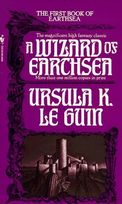
| Series: | Earthsea #1 |
| Publisher: | Bantam |
| Copyright: | November 1968 |
| Printing: | August 1975 |
| ISBN: | 0-553-26250-5 |
| Format: | Mass market |
| Pages: | 183 |
I had previously read the first three Earthsea books, but that was about ten years ago and I didn't remember them well enough to jump into the fourth book. There is also a miniseries upcoming on the Sci-Fi Channel in the US and the books are nice and short, so this seemed like a good time to re-read them.
The memory that stuck in my mind of A Wizard of Earthsea was one of boredom. I was expecting to be pleasantly surprised, given that I've since developed more of a taste for Le Guin's slow but sophisticated writing style. As it turns out, though, memory was pretty much spot on.
I'm not quite sure why I find this book so dull. Certainly, quite a bit happens in it. The plot moves right along, visiting quite a variety of locations in a mere 180 pages and painting each one with enough description that I at least get a basic feel for the area. The main character is interesting enough, the handling of magic is quite good for creating a mythic feel, the world is different and intriguing, and the ending is satisfying (if a little bit predictable). All in all, you'd think that one had the makings of a decent young adult novel, and it's not that it's a bad book, but....
I think most of the problem I had was the narrative tone. Le Guin wanders a bit too far to the side of description for me at the best of times, but A Wizard of Earthsea can be downright dry. The story is told with a very remote, detached voice, giving the impression of someone relating a legend of events long ago, a legend that they've heard so many times that it's lost emotional impact. Ged certainly goes through strong emotions in the course of the story, but they don't seem to ever really touch the narrator, and because of that I never felt emotionally involved in the story. There is also rather a lot of telling rather than showing, particularly with regard to how Ged is feeling, and while the telling is at times quietly lyrical, I still could have used more help with seeing Ged as a living and dynamic character.
The narrative tone is clearly intentional, a deliberate stylistic choice rather than a failure of craft. This makes me think that others may well like it far better than I, and that most of my dislike is just a matter of taste. And, to be fair, it's possible that this book has simply lost emotional impact for me personally, since this was my second reading and I found I remembered most of the highlights even after ten years (something of a recommendation itself). Not all books survive re-reading well.
One thing I do love about this book is that the characters are never stupid. Ged is impulsive, arrogant, and makes some bad choices when young, but I never felt like he's just being dim. The experienced senior wizards act their age and conduct themselves as appropriate to their expertise, characters know what I expect them to know, people don't show off their power blatantly when there's no need to do so, and the problems that the characters have trouble with actually feel difficult. This can be sadly rare in fantasy, particularly sustained through a whole book, and Le Guin deserves a lot of credit for it.
Overall, though, if your taste is similar to mine, I don't particularly recommend this one unless you really love Le Guin's descriptions. It's worth reading as a springboard into the later books (which, if I recall correctly, significantly improve), but I personally wouldn't read it again on its own right.
Followed by The Tombs of Atuan.
Reviewed: 2004-11-29